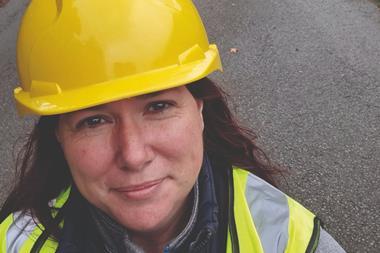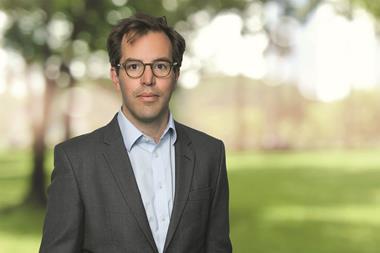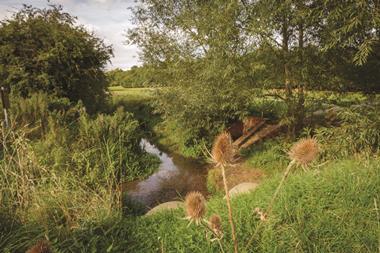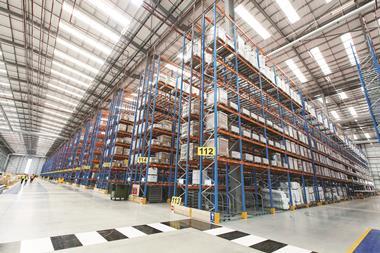Lasting improvements in behaviour and the built environment go hand in hand. They take a long time to complete, but the symbolic laying of foundation stones can announce in the near term a determined and deliberate commitment to follow a course to success.

For me, the Levelling Up White Paper creates the platform for galvanising the many parts of England where opportunity, prosperity and wellbeing have faltered for too long. Outcomes that combine the efforts of many government departments to improve education and healthy living, alongside increased employment and productivity, are promised and needed.
As chair of Homes England, the government’s housing and regeneration agency, I’d like to describe three very different placemaking initiatives, each about 20 years old, that demonstrate the importance of the public and private sectors working together.
These initiatives not only promised but delivered long-term changes to the built environment, bringing people together in fabulous open spaces, creating great work environments and replacing dereliction and deprivation with confidence, pride and optimism.
Two of the projects, the English Cities Fund and the greening of the Avenue Coking Works in Chesterfield, have been nurtured by Homes England. The third is King’s Cross in London (pictured), for which I set out the business plan as one of the founders of the developer Argent when bidding for the part-state-owned site in 2000.
What transformations have each of these ideas, visions and business plans delivered? What do they presage for what a truly joined-up levelling-up programme can do?
The Avenue Coking Works had been described, prior to government intervention, as the most contaminated brownfield site in Europe – a liability and an eyesore. After treating two million cubic feet of contaminated soil, it now offers 170 acres of fabulous parkland, 500 homes and a new primary school – a total transformation of a wasted asset into a strong amenity.

The second 20-year-old intervention is the creation of an unusual partnership between the private and public sectors – the English Cities Fund. It was set up to bring together the skills, finance and convening power of three very different shareholders.
Legal & General, as a major, long-term investment and pension fund adviser, offered patient capital and property insight, showing a willingness to invest in places and projects thought too difficult by most more passive and less socially minded investors.
Muse, a developer prepared to tackle schemes others would look on as too complicated – with the challenges of mixed-use, weaker economics, contamination and land assembly – offered focused delivery expertise. The third partner, English Partnerships (Homes England’s predecessor), brought government money and convening power with the relevant local authorities.
Together, the English Cities Fund has delivered, and continues to deliver, game-changing projects involving homes and employment space that have seen vast swathes of abandoned or condemned post-industrial space in Salford turned into places in which people choose to live, work and meet up.
King’s Cross rejuvenation
Anybody under 40 visiting King’s Cross today would have little idea of how it looked when Argent was chosen in 2000 to design and deliver a new quarter of London on a 67-acre contaminated site immediately behind the railway station. What had once been London’s main logistics interchange – where canal and railways met London’s roadways to bring fish from the North Sea and coal from the Midlands – had become abandoned.
Twenty years on, it is a pedestrianised haven full of homes, shops, restaurants, cinemas and business space, as well as being the London HQ for the digital economy with headquarters for both Google and Facebook. But alongside these high-profile public uses, my colleagues are most proud of the fact that this is not a gated community or business park. It’s not a place you can only go to if you have money to spend.
We have created a new academy primary school, which also includes a special-needs deaf school. From May to October, Granary Square – one of the 10 new places we have created for the public – is thronged with children and their families playing in the fountains, with free benches and deckchairs.
The white paper highlights the role intended for Homes England in regeneration. We will work hard to use the lessons we have learned across many projects, such as the Coking Works, to lay the foundation stones in the next few years for a programme of regeneration whose results will provide enormous long-term benefits and create a sense of pride in place.
In order to do this, we will form collaborations of the willing between local authorities, mayoral combined authorities, developers, designers, housebuilders, businesses, residents and universities. By laying the foundation stones together now, we can set ourselves on a course to success.
Peter Freeman CBE is chair of Homes England
































No comments yet